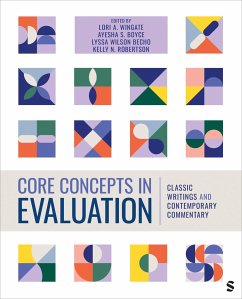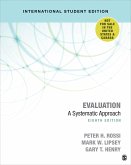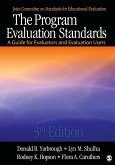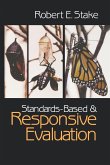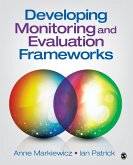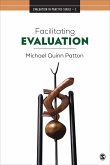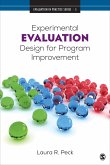Core Concepts in Evaluation
Classic Writings and Contemporary Commentary
Herausgeber: Boyce, Ayesha S.; Becho, Lyssa Wilson; Wingate, Lori A.; Robertson, Kelly N.
Core Concepts in Evaluation
Classic Writings and Contemporary Commentary
Herausgeber: Boyce, Ayesha S.; Becho, Lyssa Wilson; Wingate, Lori A.; Robertson, Kelly N.
- Broschiertes Buch
- Merkliste
- Auf die Merkliste
- Bewerten Bewerten
- Teilen
- Produkt teilen
- Produkterinnerung
- Produkterinnerung
This unique book features original writings from evaluation's foundational thinkers, together with new commentaries from contemporary authors. Each section includes an introduction to a core evaluation concept by the editors, a classic reading, two commentaries on that topic by contemporary authors, and a reflection guide written by the editors.
Andere Kunden interessierten sich auch für
![Evaluation - International Student Edition Evaluation - International Student Edition]() Peter H. RossiEvaluation - International Student Edition153,99 €
Peter H. RossiEvaluation - International Student Edition153,99 €![The Program Evaluation Standards The Program Evaluation Standards]() Donald B. YarbroughThe Program Evaluation Standards95,99 €
Donald B. YarbroughThe Program Evaluation Standards95,99 €![Fourth Generation Evaluation Fourth Generation Evaluation]() Egon G. GubaFourth Generation Evaluation98,99 €
Egon G. GubaFourth Generation Evaluation98,99 €![Standards-Based and Responsive Evaluation Standards-Based and Responsive Evaluation]() Robert E. StakeStandards-Based and Responsive Evaluation128,99 €
Robert E. StakeStandards-Based and Responsive Evaluation128,99 €![Developing Monitoring and Evaluation Frameworks Developing Monitoring and Evaluation Frameworks]() Anne MarkiewiczDeveloping Monitoring and Evaluation Frameworks71,99 €
Anne MarkiewiczDeveloping Monitoring and Evaluation Frameworks71,99 €![Facilitating Evaluation Facilitating Evaluation]() Michael Quinn PattonFacilitating Evaluation54,99 €
Michael Quinn PattonFacilitating Evaluation54,99 €![Experimental Evaluation Design for Program Improvement Experimental Evaluation Design for Program Improvement]() Laura R. PeckExperimental Evaluation Design for Program Improvement54,99 €
Laura R. PeckExperimental Evaluation Design for Program Improvement54,99 €-
-
-
This unique book features original writings from evaluation's foundational thinkers, together with new commentaries from contemporary authors. Each section includes an introduction to a core evaluation concept by the editors, a classic reading, two commentaries on that topic by contemporary authors, and a reflection guide written by the editors.
Hinweis: Dieser Artikel kann nur an eine deutsche Lieferadresse ausgeliefert werden.
Hinweis: Dieser Artikel kann nur an eine deutsche Lieferadresse ausgeliefert werden.
Produktdetails
- Produktdetails
- Verlag: SAGE Publications Inc
- Seitenzahl: 392
- Erscheinungstermin: 10. Oktober 2024
- Englisch
- Abmessung: 185mm x 233mm x 27mm
- Gewicht: 712g
- ISBN-13: 9781071883839
- ISBN-10: 1071883836
- Artikelnr.: 69234342
- Herstellerkennzeichnung
- Libri GmbH
- Europaallee 1
- 36244 Bad Hersfeld
- gpsr@libri.de
- Verlag: SAGE Publications Inc
- Seitenzahl: 392
- Erscheinungstermin: 10. Oktober 2024
- Englisch
- Abmessung: 185mm x 233mm x 27mm
- Gewicht: 712g
- ISBN-13: 9781071883839
- ISBN-10: 1071883836
- Artikelnr.: 69234342
- Herstellerkennzeichnung
- Libri GmbH
- Europaallee 1
- 36244 Bad Hersfeld
- gpsr@libri.de
Lori A. Wingate is the Executive Director of The Evaluation Center at Western Michigan University. She has a Ph.D. in interdisciplinary evaluation and 30 years of experience in the evaluation field. Dr. Wingate has led a range of evaluation projects in STEM education, public health, and higher education and has delivered more than 75 webinars and workshops on evaluation in various national contexts. She served as a subject matter expert in evaluation for the U.S. Centers for Disease Control and Prevention (CDC) for a decade and has held two intergovernmental personnel appointments at the CDC. She is a co-author of the fifth edition of Program Evaluation: Alternative Approaches and Practical Guidelines and co-led the creation of The Evaluation Center's online training program, Valeo. Ayesha S. Boyce is an associate professor in the Division of Educational Leadership and Innovation at Arizona State University. She also co-directs the STEM Program Evaluation Lab. Dr. Boyce's scholarship focuses on attending to value stances and issues related to diversity, equity, inclusion, access, cultural responsiveness, and social justice within evaluation--especially multi-site, STEM, and contexts with historically and systematically marginalized populations. She also examines teaching, mentoring, and learning in evaluation. She has evaluated more than 60 programs funded by the National Science Foundation (NSF), the US Department of Education, the National Institutes of Health, and Spencer and Teagle Foundations. Dr. Boyce is a 2019 American Evaluation Association (AEA) Marcia Guttentag Promising New Evaluator Award recipient and currently sits on the AEA board. Lyssa Wilson Becho is an evaluation scholar-practitioner. She works as a principal research associate at The Evaluation Center at Western Michigan University. Dr. Becho directs an evaluation capacity-building initiative funded by the U.S. National Science Foundation, focusing on developing capacity in evaluation practice and use for both evaluation practitioners and consumers. Her scholarship focuses on bridging evaluation theory to practice and making approaches to evaluation accessible. She has a Ph.D. in interdisciplinary evaluation and 10 years of experience evaluating local, state-, and nation-wide projects. Dr. Becho is also the co-executive editor of the Journal of MultiDisciplinary Evaluation. Kelly N. Robertson works as a principal research associate at The Evaluation Center at Western Michigan University. She has extensive experience conducting social justice-focused evaluations, publishing scholarly articles, and creating evaluation capacity-strengthening resources (e.g., webinars, guides, checklists). Dr. Robertson co-led the creation of The Evaluation Center's online training program, Valeo. She has a Ph.D. in interdisciplinary evaluation and over 15 years of experience in the field of program evaluation. She also has a master's degree in international development and a certificate in nonprofit leadership.
Introduction - Lori A. Wingate, Ayesha S. Boyce, Lyssa Wilson Becho, and
Kelly N. Robertson
Introduction Classic Piece: Let's Eliminate the Confusion: What is
Evaluation? - Leander L. Boykin
Part I. Evaluation is a distinct form of inquiry that is oriented to
reaching judgments of merit, worth, or significance.
Part I Introduction - Lyssa Wilson Becho
Part I Classic Piece: The Nature of Evaluation - Michael Scriven
Chapter 1: Amending the Architectural Blueprints for Evaluation - Bianca
Montrosse-Moorhead and Khalil Bitar
Chapter 2: Lack of Discipline: Answering Scriven's Call for Value in
(Program) Evaluation - Ghislain Arbour
Part I Reflection Guide - Lyssa Wilson Becho
Part II. Engagement enhances the usefulness and relevance of evaluation.
Part II Introduction - Kelly N. Robertson
Part II Classic Piece: The Stakeholder Approach to Evaluation: Origins and
Promise - Carol Weiss
Chapter 3: Evaluation Engagement: Historical Perspectives and New
Directions With Community-Based Participatory Research (CBPR) Principles -
Tatiana E. Bustos, Oyesola Oluwafunmilayo Ayeni, and Jessica S. Saucedo
Chapter 4: I.M.P.A.C.T.: A Manumission Mindset and Other Engagement
Approaches for Evaluation - Sharon Attipoe-Dorcoo and Norma Martínez-Rubin
Part II Reflection Guide - Kelly N. Robertson
Part III. Evaluation is inherently political.
Part III Introduction - Lori A. Wingate
Part III Classic Piece: What Have We Learned About the Politics of Program
Evaluation? - Eleanor Chelimsky
Chapter 5: The Power and Politics of Knowledge Production in Program
Evaluation: Funder, Methodological, and Pedagogical Colonialism - Jennifer
Billman and Bagele Chilisia
Chapter 6: Walking the Tightrope Between Independence and Responsiveness:
Falling Off Is Not an Option - Rakesh Mohan
Part III Reflection Guide - Lori A. Wingate
Part IV. Culturally responsive evaluation practice can lead to a more just
society.
Part IV Introduction - Ayesha S. Boyce
Part IV Classic Piece: Responsive Evaluation Amistad Style: Perspectives of
One African American Evaluator - Stafford Hood
Chapter 7: En Busca de las Voces Latinas in CRE: Reflections From a Program
Evaluation Latina - Grettel Arias Orozco
Chapter 8: Black Methodologies for Black Evaluators - Deja Taylor,
Sojourner White, Superior Murphy, Radaya Ellis, and monique liston
Part IV Reflection Guide - Ayesha S. Boyce
Part V. Evaluation's value is realized through its use and influence.
Part V Introduction - Ayesha S. Boyce
Part V Classic Piece: Utilization-Focused Evaluation - Michael Quinn Patton
Chapter 9: Aims, Aspirations, and Consequences: Problematization at the
Intersection of Culture and Evaluation Use - Jeremy Acree and Jill
Chouinard
Chapter 10: Beyond the Project: Using Evaluation to Reimagine the Future in
Africa - Caitlin A. Blaser Mapitsa and Mine Pabari
Part V Reflection Guide - Ayesha S. Boyce
Part VI. Evaluation is a reflexive practice: Evaluation can and should be
evaluated.
Part VI Introduction - Lori A. Wingate
Part VI Classic Piece: Metaevaluation - Daniel L. Stufflebeam
Chapter 11: Revisiting Metaevaluation Through the Perspectives of the
Global South - Paidamoyo Chikate, Satlaj Dighe, Padma Kannan, and John M.
LaVelle
Chapter 12: A New Story for Metaevaluation - Tiffany Tovey and Libby Smith
Part VI Reflection Guide - Lori A. Wingate
References
Author Index
Subject Index
Kelly N. Robertson
Introduction Classic Piece: Let's Eliminate the Confusion: What is
Evaluation? - Leander L. Boykin
Part I. Evaluation is a distinct form of inquiry that is oriented to
reaching judgments of merit, worth, or significance.
Part I Introduction - Lyssa Wilson Becho
Part I Classic Piece: The Nature of Evaluation - Michael Scriven
Chapter 1: Amending the Architectural Blueprints for Evaluation - Bianca
Montrosse-Moorhead and Khalil Bitar
Chapter 2: Lack of Discipline: Answering Scriven's Call for Value in
(Program) Evaluation - Ghislain Arbour
Part I Reflection Guide - Lyssa Wilson Becho
Part II. Engagement enhances the usefulness and relevance of evaluation.
Part II Introduction - Kelly N. Robertson
Part II Classic Piece: The Stakeholder Approach to Evaluation: Origins and
Promise - Carol Weiss
Chapter 3: Evaluation Engagement: Historical Perspectives and New
Directions With Community-Based Participatory Research (CBPR) Principles -
Tatiana E. Bustos, Oyesola Oluwafunmilayo Ayeni, and Jessica S. Saucedo
Chapter 4: I.M.P.A.C.T.: A Manumission Mindset and Other Engagement
Approaches for Evaluation - Sharon Attipoe-Dorcoo and Norma Martínez-Rubin
Part II Reflection Guide - Kelly N. Robertson
Part III. Evaluation is inherently political.
Part III Introduction - Lori A. Wingate
Part III Classic Piece: What Have We Learned About the Politics of Program
Evaluation? - Eleanor Chelimsky
Chapter 5: The Power and Politics of Knowledge Production in Program
Evaluation: Funder, Methodological, and Pedagogical Colonialism - Jennifer
Billman and Bagele Chilisia
Chapter 6: Walking the Tightrope Between Independence and Responsiveness:
Falling Off Is Not an Option - Rakesh Mohan
Part III Reflection Guide - Lori A. Wingate
Part IV. Culturally responsive evaluation practice can lead to a more just
society.
Part IV Introduction - Ayesha S. Boyce
Part IV Classic Piece: Responsive Evaluation Amistad Style: Perspectives of
One African American Evaluator - Stafford Hood
Chapter 7: En Busca de las Voces Latinas in CRE: Reflections From a Program
Evaluation Latina - Grettel Arias Orozco
Chapter 8: Black Methodologies for Black Evaluators - Deja Taylor,
Sojourner White, Superior Murphy, Radaya Ellis, and monique liston
Part IV Reflection Guide - Ayesha S. Boyce
Part V. Evaluation's value is realized through its use and influence.
Part V Introduction - Ayesha S. Boyce
Part V Classic Piece: Utilization-Focused Evaluation - Michael Quinn Patton
Chapter 9: Aims, Aspirations, and Consequences: Problematization at the
Intersection of Culture and Evaluation Use - Jeremy Acree and Jill
Chouinard
Chapter 10: Beyond the Project: Using Evaluation to Reimagine the Future in
Africa - Caitlin A. Blaser Mapitsa and Mine Pabari
Part V Reflection Guide - Ayesha S. Boyce
Part VI. Evaluation is a reflexive practice: Evaluation can and should be
evaluated.
Part VI Introduction - Lori A. Wingate
Part VI Classic Piece: Metaevaluation - Daniel L. Stufflebeam
Chapter 11: Revisiting Metaevaluation Through the Perspectives of the
Global South - Paidamoyo Chikate, Satlaj Dighe, Padma Kannan, and John M.
LaVelle
Chapter 12: A New Story for Metaevaluation - Tiffany Tovey and Libby Smith
Part VI Reflection Guide - Lori A. Wingate
References
Author Index
Subject Index
Introduction - Lori A. Wingate, Ayesha S. Boyce, Lyssa Wilson Becho, and
Kelly N. Robertson
Introduction Classic Piece: Let's Eliminate the Confusion: What is
Evaluation? - Leander L. Boykin
Part I. Evaluation is a distinct form of inquiry that is oriented to
reaching judgments of merit, worth, or significance.
Part I Introduction - Lyssa Wilson Becho
Part I Classic Piece: The Nature of Evaluation - Michael Scriven
Chapter 1: Amending the Architectural Blueprints for Evaluation - Bianca
Montrosse-Moorhead and Khalil Bitar
Chapter 2: Lack of Discipline: Answering Scriven's Call for Value in
(Program) Evaluation - Ghislain Arbour
Part I Reflection Guide - Lyssa Wilson Becho
Part II. Engagement enhances the usefulness and relevance of evaluation.
Part II Introduction - Kelly N. Robertson
Part II Classic Piece: The Stakeholder Approach to Evaluation: Origins and
Promise - Carol Weiss
Chapter 3: Evaluation Engagement: Historical Perspectives and New
Directions With Community-Based Participatory Research (CBPR) Principles -
Tatiana E. Bustos, Oyesola Oluwafunmilayo Ayeni, and Jessica S. Saucedo
Chapter 4: I.M.P.A.C.T.: A Manumission Mindset and Other Engagement
Approaches for Evaluation - Sharon Attipoe-Dorcoo and Norma Martínez-Rubin
Part II Reflection Guide - Kelly N. Robertson
Part III. Evaluation is inherently political.
Part III Introduction - Lori A. Wingate
Part III Classic Piece: What Have We Learned About the Politics of Program
Evaluation? - Eleanor Chelimsky
Chapter 5: The Power and Politics of Knowledge Production in Program
Evaluation: Funder, Methodological, and Pedagogical Colonialism - Jennifer
Billman and Bagele Chilisia
Chapter 6: Walking the Tightrope Between Independence and Responsiveness:
Falling Off Is Not an Option - Rakesh Mohan
Part III Reflection Guide - Lori A. Wingate
Part IV. Culturally responsive evaluation practice can lead to a more just
society.
Part IV Introduction - Ayesha S. Boyce
Part IV Classic Piece: Responsive Evaluation Amistad Style: Perspectives of
One African American Evaluator - Stafford Hood
Chapter 7: En Busca de las Voces Latinas in CRE: Reflections From a Program
Evaluation Latina - Grettel Arias Orozco
Chapter 8: Black Methodologies for Black Evaluators - Deja Taylor,
Sojourner White, Superior Murphy, Radaya Ellis, and monique liston
Part IV Reflection Guide - Ayesha S. Boyce
Part V. Evaluation's value is realized through its use and influence.
Part V Introduction - Ayesha S. Boyce
Part V Classic Piece: Utilization-Focused Evaluation - Michael Quinn Patton
Chapter 9: Aims, Aspirations, and Consequences: Problematization at the
Intersection of Culture and Evaluation Use - Jeremy Acree and Jill
Chouinard
Chapter 10: Beyond the Project: Using Evaluation to Reimagine the Future in
Africa - Caitlin A. Blaser Mapitsa and Mine Pabari
Part V Reflection Guide - Ayesha S. Boyce
Part VI. Evaluation is a reflexive practice: Evaluation can and should be
evaluated.
Part VI Introduction - Lori A. Wingate
Part VI Classic Piece: Metaevaluation - Daniel L. Stufflebeam
Chapter 11: Revisiting Metaevaluation Through the Perspectives of the
Global South - Paidamoyo Chikate, Satlaj Dighe, Padma Kannan, and John M.
LaVelle
Chapter 12: A New Story for Metaevaluation - Tiffany Tovey and Libby Smith
Part VI Reflection Guide - Lori A. Wingate
References
Author Index
Subject Index
Kelly N. Robertson
Introduction Classic Piece: Let's Eliminate the Confusion: What is
Evaluation? - Leander L. Boykin
Part I. Evaluation is a distinct form of inquiry that is oriented to
reaching judgments of merit, worth, or significance.
Part I Introduction - Lyssa Wilson Becho
Part I Classic Piece: The Nature of Evaluation - Michael Scriven
Chapter 1: Amending the Architectural Blueprints for Evaluation - Bianca
Montrosse-Moorhead and Khalil Bitar
Chapter 2: Lack of Discipline: Answering Scriven's Call for Value in
(Program) Evaluation - Ghislain Arbour
Part I Reflection Guide - Lyssa Wilson Becho
Part II. Engagement enhances the usefulness and relevance of evaluation.
Part II Introduction - Kelly N. Robertson
Part II Classic Piece: The Stakeholder Approach to Evaluation: Origins and
Promise - Carol Weiss
Chapter 3: Evaluation Engagement: Historical Perspectives and New
Directions With Community-Based Participatory Research (CBPR) Principles -
Tatiana E. Bustos, Oyesola Oluwafunmilayo Ayeni, and Jessica S. Saucedo
Chapter 4: I.M.P.A.C.T.: A Manumission Mindset and Other Engagement
Approaches for Evaluation - Sharon Attipoe-Dorcoo and Norma Martínez-Rubin
Part II Reflection Guide - Kelly N. Robertson
Part III. Evaluation is inherently political.
Part III Introduction - Lori A. Wingate
Part III Classic Piece: What Have We Learned About the Politics of Program
Evaluation? - Eleanor Chelimsky
Chapter 5: The Power and Politics of Knowledge Production in Program
Evaluation: Funder, Methodological, and Pedagogical Colonialism - Jennifer
Billman and Bagele Chilisia
Chapter 6: Walking the Tightrope Between Independence and Responsiveness:
Falling Off Is Not an Option - Rakesh Mohan
Part III Reflection Guide - Lori A. Wingate
Part IV. Culturally responsive evaluation practice can lead to a more just
society.
Part IV Introduction - Ayesha S. Boyce
Part IV Classic Piece: Responsive Evaluation Amistad Style: Perspectives of
One African American Evaluator - Stafford Hood
Chapter 7: En Busca de las Voces Latinas in CRE: Reflections From a Program
Evaluation Latina - Grettel Arias Orozco
Chapter 8: Black Methodologies for Black Evaluators - Deja Taylor,
Sojourner White, Superior Murphy, Radaya Ellis, and monique liston
Part IV Reflection Guide - Ayesha S. Boyce
Part V. Evaluation's value is realized through its use and influence.
Part V Introduction - Ayesha S. Boyce
Part V Classic Piece: Utilization-Focused Evaluation - Michael Quinn Patton
Chapter 9: Aims, Aspirations, and Consequences: Problematization at the
Intersection of Culture and Evaluation Use - Jeremy Acree and Jill
Chouinard
Chapter 10: Beyond the Project: Using Evaluation to Reimagine the Future in
Africa - Caitlin A. Blaser Mapitsa and Mine Pabari
Part V Reflection Guide - Ayesha S. Boyce
Part VI. Evaluation is a reflexive practice: Evaluation can and should be
evaluated.
Part VI Introduction - Lori A. Wingate
Part VI Classic Piece: Metaevaluation - Daniel L. Stufflebeam
Chapter 11: Revisiting Metaevaluation Through the Perspectives of the
Global South - Paidamoyo Chikate, Satlaj Dighe, Padma Kannan, and John M.
LaVelle
Chapter 12: A New Story for Metaevaluation - Tiffany Tovey and Libby Smith
Part VI Reflection Guide - Lori A. Wingate
References
Author Index
Subject Index

